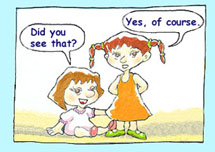Grammar: Sentence: Quoting and reporting speech and thoughts
| Quoting speech and thoughts |
Uses of direct speech
In spoken language, we find direct speech used in different types of stories, eg in traditional stories (fairy tales, fables), in narratives of personal experience (told to entertain an audience), and in recounts of seemingly ordinary events (told to create solidarity with our listeners).
In written texts, we find direct speech used in presenting dialogue in comics and stories. Direct speech is also important in newspaper reports where the writer might quote the account of an eye witness to an accident, as well as the official police report about the same accident.
Although the role of direct speech is important in these types of texts, the more usual way of representing what someone has said is to use indirect speech. Thoughts are also generally reported using indirect speech.
We can make the representation of dialogue interesting in two ways: by making our choice of quoting verbs reflect the speech roles that the characters in the dialogue are playing; and by making our quoting verbs indicate something of the character of the speaker, or the style in which they are speaking.
Verbs indicating speech roles
To give a sense of the speech roles the characters in a dialogue are playing, verbs such as ask and reply are often better than the verb say:
|
 |
Other verbs used to indicate speech roles in dialogue are answer, respond, rebut, retort etc.
Verbs indicating speaking style
By choosing verbs that indicate the character of the speaker, or the style in which they are speaking, we can add some colour to a dialogue. While the most commonly used verb to quote direct speech is say, this is best limited to making Statements. Other verbs may be used with Questions, Commands and Exclamations:
| Statement | ||
| "I'm so tired." he said. | ||
| Question | ||
|
"Why can't I sleep?" he said. "Why can't I sleep?" he asked. [more precise about mood] "Why can't I sleep?" he demanded (to know). [precise about mood and style] |
||
| Command | ||
|
"Get me a big bag full of sleep!" he said to
SleepStealer. "Get me a big bag full of sleep!" he told SleepStealer. [more precise about mood] "Get me a big bag full of sleep!" he ordered SleepStealer. [precise about mood and style] |
||
| Exclamation | ||
|
"Oh don't be so silly!" said
Granny. "Oh don't be so silly!" shouted Granny. [more precise about mood] "Oh don't be so silly!" cried Granny. [precise about mood and style] |
||
Many 'doing' verbs normally used to describe human behaviour can be used to quote, eg bark, blurt out, come out with, growl, grunt, sing, whine etc. Some of these are strongly associated with particular speech functions, eg bark with a Command, as in "Put your hands up," barked the policeman.
For more information on dialogue in text, see:
| Text types: Stories: Quoting and reporting thoughts and feelings | |
|
|
Text types: Stories: Quoting and reporting what people say |
Note that the terms Command, Exclamation, Offer, Question and Statement are written with an initial capital to remind us that they are functional terms.
Tell me more ... Structure of direct speech |
|
||
To give us feedback about this section, click here or on the Comment button at the top of the screen.
If you have any questions about this section, visit the Language Corner.
If you have any questions or suggestions about how to teach this section, send a message to the Teaching Corner.